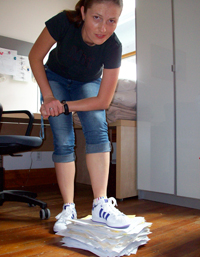Martina Balagović
Graduate Student 2008-2011

I am a fourth year graduate student. I was born in Zagreb, Croatia, and finished my undergraduate degree there. Boston became my home four years ago when I moved here to do a PhD at MIT. I am interested in all things algebraic; this currently means representation theory and things like Lie algebras, quantum groups, rational Cherednik algebras, tensor categories, and differential equations that can be described in terms of such objects. I like my algebras to be infinite dimensional, noncommutative, have some combinatorial structure (for doing nice long computations), some relation with geometry (for getting intuition on what the long computations really mean) and some relation with physics (for explaining to all my doctor and lawyer friends what I do). The words representation, deformation and quantization show up on my desk a lot; maybe at some point in the future the word categorification will as well.
Grad students describe their experiences here in different ways (exciting, stressful, interesting, demanding, and traumatizing are some of the adjectives used) but intense is never missing.
There are countless classes, seminars with mathematicians from other Boston universities, talks by faculty members and guests, so much that someone going to everything that is potentially interesting can end up with a full schedule, some overlaps, and no work done alone in the office. There is definitely a feeling that this is where math of the future is being created. I think that beginner researchers profit a lot from that atmosphere.
Moving from an undergraduate type education (learning) to graduate type education (research) changes many paradigms, and it's hard to come to terms with some of them. For example, there's less and less opportunity to say "I'll just quickly look at any book on this standard topic and I'm sure the answer will be there", "I'll just ask any older student and they'll know", or even "I know this problem has a solution". On the other hand, for me this was the point where mathematics stopped being a solitary activity and became something that I can discuss with others interested in the same things. Even though a lot of work still needs to be done in isolation (pen, paper, a cup of coffee and a lot of silence), now it is possible to discuss ideas and talk about the big picture and about relations to other areas of math in company of other mathematicians (chalk, blackboard, several cups of coffee and a lot of talking). This way, one can learn as much chatting during a tea hour as staring at a book during a working hour (which in turn makes one feel less guilty about regularly appearing for the tea hour and annihilating a handful of free chocolate chip cookies every day).
I love teaching and mentoring, and am trying to have a good research:learning:teaching ratio (and if I ever figure out how to achieve it, I will let you know). It is extremely gratifying to work with students that are interested in the material and watching them advance, independent on which level they are starting from. In addition to that, it also works for me from a very selfish point of view: seeing students improve their understanding through work often worked as an encouragement for me to try learning something new in my research area.
Another exciting teaching opportunity is that undergraduates interested in research and high school students visiting MIT give graduate students a chance to try their hand in mentoring and supervising research. It means we get to work on a different project on the side, and to see mentoring from a different perspective (my perspective mostly being: "Wow, how do some professors manage to work with so many graduate students all the time?!").
Social life of a graduate student is confined by time limitations, as "The Thesis" is always looming in the background, but it is much more fun than one would expect and less stereotypically nerdy.
In fact, I found that the stereotype of a math nerd as an asocial eccentric who never has any fun is very far from true. Based on my experiences at MIT, I could suggest some replacement stereotypes: "most mathematicians have good dinner parties (some can even cook)", "most mathematicians like hiking (getting lost in a thunderstorm is always a favorite)", and "most mathematicians can be dared to do karaoke and to dance, any time, to any song".
All in all, the graduate experience in MIT math is the most exciting, frustrating, challenging, work intensive, fun, rewarding, scary, amazing thing I was ever a part of.